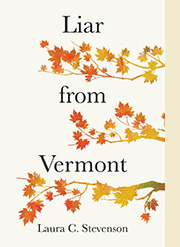A New Series: One Minute Reviews of
Books by Vermont Authors
Laura's column "One Minute Reviews" has appeared bi-weekly in Wilmington, Vermont's Deerfield Valley News since 2015. In April 2018, she found that no Vermont periodical consistently reviews all commercially published fiction and non-fiction by Vermont authors, so she started a series to fill that void. Published reviews from that series and some earlier reviews of local authors are listed with links to a scan of the printed copy. Reviews still in queue are listed without links until they appear in print.
The books reviewed in this series are available through Wilmington's Pettee Memorial Library, the Whitingham Free Public Library, and locally owned Bartleby's Books in Wilmington.
Deerfield Valley News, , 12/8/2022
A Novel of Vermont’s Granite Industry
Eric Pope, Granite Kingdom: A Novel. Rootstock Publishing, 2022
This impressively researched historical novel revolves around a major business rivalry in Granite Junction, a fictive village in Vermont’s Northeast Kingdom at a time when Vermont’s granite industry was at its height. One of the rivals is Ernest Wheeler, an erstwhile farm boy who, admiring the heroes of Horatio Alger’s novels, bought 163 acres of “worthless” granite-filled farmland and founded the successful Wheeler Granite Company. Unlike Alger’s heroes, however, Wheeler over-invested and was forced to sell the undeveloped part of his granite quarry to George Rutherford, a newcomer in the business. Rutherford’s capital comes from the wealthy family into which he has married; that and his own love for new machinery has accelerated the success of his Sterling Granite Company. As the novel opens in 1910, Rutherford has become the largest employer in Granite Junction; his business and the social successes of his ambitious wife are celebrated weekly in the Granite Junction Gazette, which entirely neglects Wheeler’s substantial achievements. Caught between the two rivals is 20-year-old Dan Strickland, whose father’s death has forced him to withdraw from the Academy that educates the better-off students in town, and work for a living. Bright, resourceful, and ambitious, Dan has risen from a lad-of-all-work at the Gazette to a reporter, and he hopes to rise further by courting a girl whose local status will enable him to rise higher.
Besides being a portrait of a rivalry, Granite Kingdom is a portrait of a town, its inhabitants, and its fears. For many people in the village—the Italians who work for Rutherford, or the women like Dan’s mother and the beautiful Rosa Rosetti, whose husbands have died from disease or accidents—the chief fear is exile to “the poor farm” where indigent villagers live a miserable life. At a higher level, there is fear of gossip. In a village where Women’s Temperance bears considerable sway, many respectable villagers, like the Patrolman Powers or the up-and-coming young son of the Town Clerk, buy their liquor on the sly—not to mention other things to be had from the girls at the local laundry. But the biggest fear in town is sabotage, for there are several accidents at the quarries, and newspapers from Burlington are filled with stories of violent strikes and terrifying destruction by Italian saboteurs. Rutherford, in whose quarry the fatal accidents occur, asks Dan to search the Italian community in town for possible culprits. But the only possible violence Dan encounters comes from Wheeler’s right-hand-man, Bob Blackstone, and his two sidekicks, who dislike Dan’s investigations of the accidents and bully him because the Gazette favors Rutherford, not Wheeler.
Behind this novel is Eric Pope’s ten years as editor of The Hardwick Gazette, in Hardwick Vermont, once the center of Vermont’s granite industry. Much of his research comes from historic copies of the paper, but also from intensive study of the equipment used in Hardwick’s quarries. Pope brings the 1910 granite industry to life with descriptions of train-spurs to the quarries, derricks, and minute descriptions of the dangers of moving tons of rocks in the many quarry scenes. He sympathetically portrays the dangers workers encounter, not just from accidents but of White Lung Disease from breathing granite dust, and the damage from “bumpers,” whose vibrations leave workers’ hands numb for hours after work. Filled with intricate portrayals of social ambitions and small-town competitions, the complicated plot has the “feel” of the American novels written in early twentieth century; the stylistic choice makes its portrait of the period doubly convincing.


